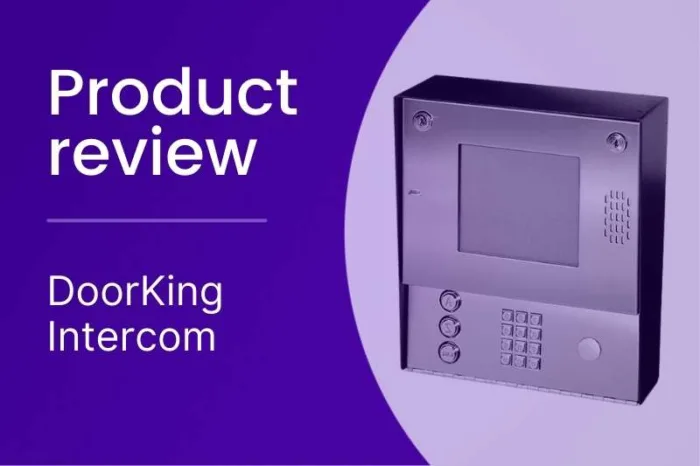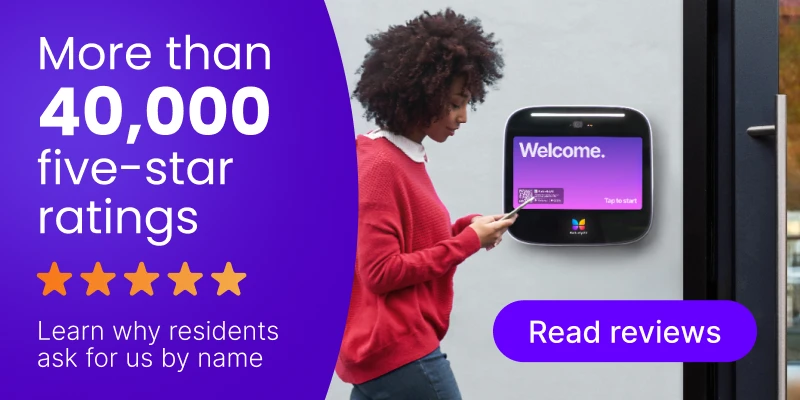Key takeaways
- DoorKing offers a versatile suite of access control solutions, ranging from video intercoms to telephone entry systems that are designed for single-family homes, apartment buildings, gated communities, and more.
- The 2112 eVolve system is DoorKing’s most advanced model, but the 1830 Series remains one of the more durable and widely recognized models.
- While DoorKing excels in durability and traditional reliability, many models lack modern features like cloud-based management, two-way video calling, and mobile access.
- While DoorKing suits properties needing rugged, basic systems, there are many other alternatives that provide modern, scalable, and user-friendly solutions that may be better suited for your property.
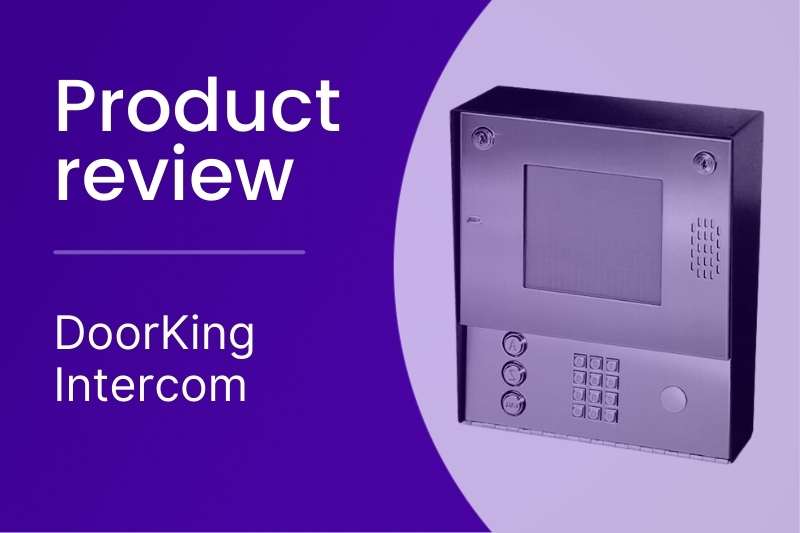
Disclaimer: ButterflyMX provides these blog posts to help our customers and potential customers make the right business decisions. Our blog posts are based on the information available to us at the time of writing.
DoorKing is a leading intercom manufacturer whose products you’ve likely seen before. So, if you’re considering an apartment video intercom system or gate entry system, you may be considering DoorKing.
Well, this DoorKing Intercom review will cover everything you need to know about their extensive catalog of door entry systems. You’ll discover the many models available, their use cases, features, and pros and cons. Most importantly, you can compare DoorKing to other leading manufacturers in the market to find the best intercom system for your property.
In this review, we cover:
- About Doorking
- Overview of DKS Entry Systems
- DoorKing Intercom review
- DoorKing FAQs
- Comparing DoorKing Entry Systems
- DoorKing vs. ButterflyMX
Watch how ButterflyMX works:
About Doorking
Founded in 1948, Doorking — also known as DKS — has been a major manufacturer of access control systems in the industry for decades. DoorKing serves a variety of markets ranging from single-family homes and multifamily buildings to commercial and industrial properties.
Based in Southern California, Doorking makes and sells a wide range of products, including but not limited to apartment intercom systems, telephone entry systems, gate intercom systems, access control systems, parking control products, and solutions for maximum security facilities.
Overview of DKS Entry Systems
As you’ll soon learn, DKS offers numerous models of their door entry solutions. However, their featured solution is the 2112 eVolve Video Entry System, featuring video calling that lets residents see and speak with guests before granting them access.
While the 2112 eVolve represents DoorKing’s modern offering, their 1830 Series remains one of the most popular and recognizable systems. Available in both the classic 80 Series and the updated 90 Series, these telephone entry systems operate on traditional phone lines but can be upgraded to cellular connectivity with the DKS Cellular Control Box.
With solutions that range from modern video intercoms to traditional telephone entry systems, DoorKing continues to deliver a versatile suite of access control products for a wide range of customers.
DoorKing Intercom review
You’ll find every series of DoorKing Intercoms reviewed below:
- Video Entry Evolve Series
- Telephone Entry 1830 Series
- Telephone Entry 1812 Series
- Standard and Access Plus
- Intercom Systems
Video Entry Evolve Series
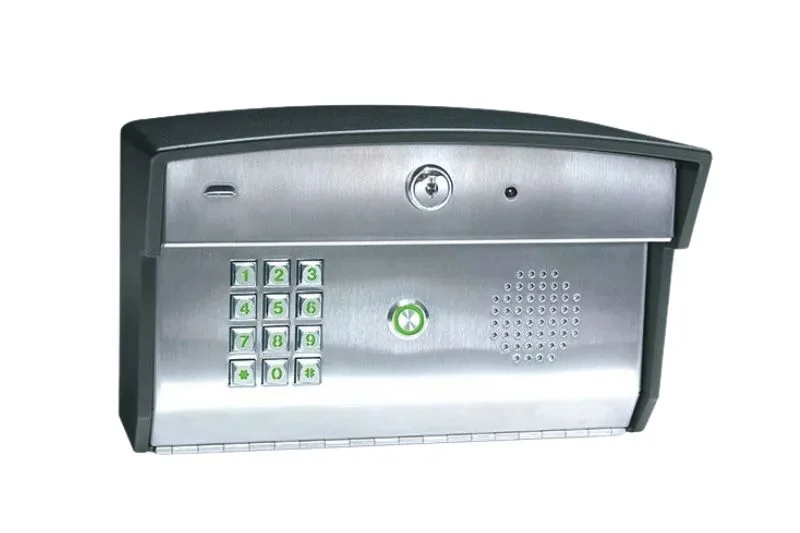
Source: DoorKing
Pricing: $1,000 to $1,200+
Use cases: Single-family homes, small multi-tenant buildings
The DoorKing eVolve Series represents the company’s most advanced entry system, designed for residential applications. These systems allow homeowners to manage access control and communicate with visitors through both voice and video, all from their smartphones.
Models
- 2112 eVolve Video Entry System
- 2108 eVolve Video Entry System
Features
- Video streaming to smartphones for visual identification of visitors
- Voice communication with guests via phone or smartphone
- Control of up to three entry points (gates, doors)
- Supports up to 25 PIN codes
- Broadcast calling to up to four designated phones simultaneously
- Browser-based programming accessible from any internet-connected device
- Cloud-based intercom management through DKS Cloud
- Built-in IP camera for supporting video calling
- Do Not Call, Hold Open, and Entry Code schedules
- Ethernet (VoIP) or cellular connection options
Pros and cons
Pros:
- Advanced video entry capabilities for residential use.
- Remote access and control via a smartphone app.
- Flexible programming and management options.
- Multiple connection options (Ethernet or cellular).
- Capable of controlling multiple access points with one device.
- Supports multiple credential access methods.
Cons:
- A cellular hardware kit is sold separately with a monthly fee if an Ethernet connection is not possible.
- The system’s limitation to 40 residents is seen as restrictive for larger properties, leading some customers to seek alternatives.
- Some users report disappointment that the system does not support two-way video calling where visitors can see residents.
- It may not support key cards or fob credentials.
- Retains an industrial metal design, which could be offputting to some customers.
Telephone Entry 1830 Series
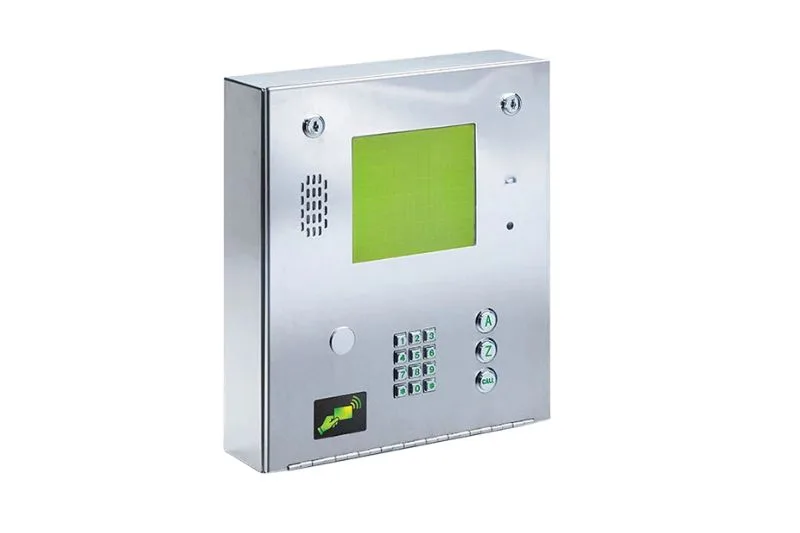
Source: DoorKing
Pricing: $1,000 to $3,500+
Use cases: Multifamily, commercial properties, gated communities
The DoorKing 1830 Series represents a range of telephone entry systems designed for large residential and commercial properties. These systems are divided into the 80 Series, a basic telephone entry system, and the 90 Series, a more advanced system with additional bells and whistles.
Models
90 Series Entry System:
- 1837
- 1835
- 1834
80 Series Entry System:
- 1837
- 1835
- 1834
- 1833
Features
- Multiple connectivity options: Cellular, VoIP, or POTS (Plain Old Telephone Service)
- Cloud-based management through DKS Cloud (requires subscription)
- Stores up to 3,000 phone numbers and 8,000 device codes
- Built-in electronic directory with LCD display
- Elevator control capability (requires additional boards)
- PC programmable with included software
- Live transaction monitoring and streaming
- Built-in clock/calendar with holiday scheduling
- Multiple access control options (card readers, keypads, RF controls)
Pros and cons
Pros:
- Highly weather resistant with a robust metal housing.
- Features highly flexible connectivity options, including cellular and internet.
- A large storage capacity of phone numbers and access codes makes it a good solution for large properties.
- It supports the ability to monitor entry activity as it occurs.
Cons:
- Some customers may find these systems outdated compared to other modern solutions.
- It’s reported that elderly residents may struggle with the potentially complicated interface.
- Some users report their disappointment in the lack of video capabilities and other advanced features.
- There have been reports of users having issues with cellular connectivity, which may impact gate opening.
- There may be a lack of third-party integrations for a unified access control system.
Telephone Entry 1812 Series
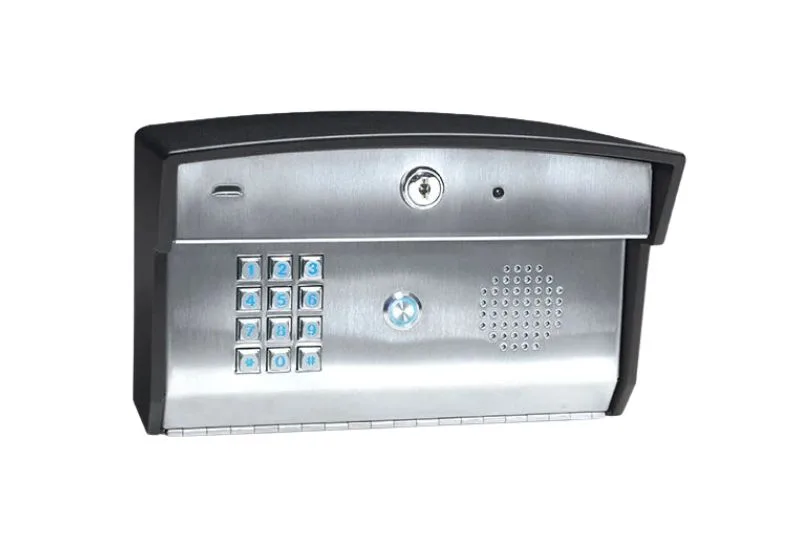
Source: DoorKing
Pricing: $900 – $1,500+
Use cases: Single-family homes and small businesses
The DoorKing 1812 Series offers residential telephone entry systems designed for single-family homes and small businesses. These systems allow homeowners to use their existing telephone as an intercom to communicate with visitors at the door or gate.
Models
- 1812 Access Plus Telephone Entry + Access Control
- 1812 Plus Telephone Entry
- 1812 Classic Telephone Intercom System
Features
- Uses existing phone line as an intercom system
- Digital voice circuit for clear communication
- Call forwarding with time-zone restrictions
- Do-not-disturb feature
- Supports multiple entry codes
- Programmable via system keypad or touch-tone telephone
- Two relays for controlling doors or gates
- Built-in call waiting
- Unique double ring to identify entry system calls
- Supports up to 10 temporary entry codes with start and end dates and times
Pros and cons
Pros:
- No additional phone line is required.
- Users report crystal clear communication with digital voice circuit
- Flexible programming options for setup.
- Multiple connectivity options to match your property’s needs.
- The call-forwarding feature ensures no missed visitor calls.
- Durable construction with weather-resistant housing.
Cons:
- Limited resident capacity compared to other models.
- An ongoing subscription may be required for some advanced features.
- Some users report the interface feels outdated compared to the systems on the market.
- Programming may be complex for some owners.
- Some users have reported issues with cellular connectivity.
Standard and Access Plus
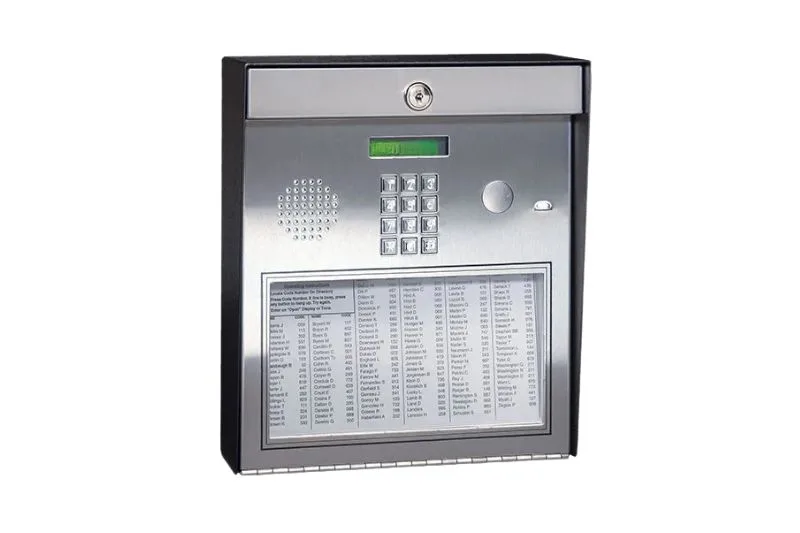
Source: DoorKing
Pricing: $1,100 – $1,500+
Use cases: Apartment buildings, gated communities, condos, office buildings, and industrial facilities
The Standard and Access Plus series represents DKS’ versatile telephone entry system, which is designed for small- to medium-sized residents and businesses. The Standard systems don’t connect to the internet and work with a traditional landline connection. Meanwhile, Access Plus systems can work with internet or cellular networks, allowing them to be remotely managed.
Models
- 1810 Entry System & Access Plus
- 1808 Entry System & Access Plus
- 1803 Entry System
- 1802 Entry System & Access Plus
Features
- Voice communication between visitors and residents via telephone
- Built-in lighted directories in select models
- PC programmable with Access Plus Manager software (Access Plus models only)
- Access Plus models support email notifications
- Event history logging for Access Plus models
- Supports entry codes for resident or employee access
- Controls multiple access points with a single device
Pros and cons
Pros:
- These systems are versatile and suitable for various property sizes and types.
- Features an easy-to-use directory management and printing software
- Remote programming and management capabilities with select models.
- Multiple connectivity options for flexibility.
- A highly durable construction with weather-resistant housing maintains its lifespan.
- Supports scalability with additional access control devices.
Cons:
- Some models feature potentially small user capacities, which isn’t suitable for some customers.
- Users have reported that programming the system may be challenging.
- It may not feature a robust selection of third-party integrations, such as smart home devices.
- Some models feature a paper directory, which could be frustrating to some properties when updating it.
Intercom System
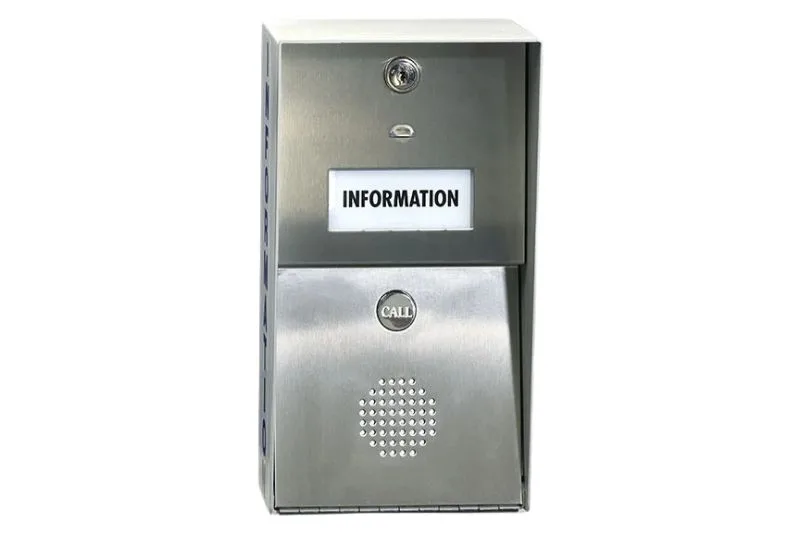
Source: DoorKing
Pricing: $900 – $1,000+
Use cases: Gated properties, office buildings, industrial facilities
DoorKing’s Intercom Systems includes the 1819 Information Phone, designed for straightforward visitor communication with a single button. Overall, this product helps facilitate communication for a single access point while maintaining the durable appearance that DKS is known for.
Models
- 1819 Information Phone
Features
- Single call button for quick and easy communication
- 10 and 11-digit dialing capability
- Manual keypad programming
- Built-in postal lock provision
- Surface mount option available
- Supports a single phone number and access point
Pros and cons
Pros:
- Simple operations with a single button for calling.
- Versatile dialing options for different phone number formats.
- Easy and straightforward installation.
- Built-in postal lock adds security to the system.
- Full-duplex communication for clear two-way conversations.
Cons:
- It may have a more limited functionality than what customers expect from door entry systems.
- The system only supports access for a single entry point and a single phone number, which could be restrictive to some.
- A lack of visual identification may be offputting for users.
- Additional components may be required for a comprehensive access control system.
DoorKing FAQs
What are the alternatives to DoorKing?
Alternatives to DoorKing include:
- ButterflyMX
- Kisi
- DoorBird
- Aiphone
- Rently
How does DoorKing work?
A majority of DoorKing systems work through telephone lines, but some support communication via the internet. Visitors use a directory or call button at the entry point to contact tenants. Then, tenants can communicate with visitors and grant access remotely by pressing a button on their phone, in-unit device, or a connected app (depending on the system).
Who owns DoorKing?
DoorKing is a family-owned business that was started in 1948 by M.K. Richmond. The Richmond family continues to own and operate DoorKing today.
Comparing DoorKing to other brands
You can compare DoorKing to other popular door entry system brands below:
DoorKing vs. DoorBird
DoorKing and DoorBird serve different markets, with the former focusing on larger properties and the latter targeting single-family homes and small businesses. Of course, both offer products for properties of all sizes, and their products reflect that.
- Video features. DoorBird offers standard video features with 720p and 1080p HD video, 180-degree ultra-wide-angle lens, and night vision, whereas DoorKing’s video options are more limited and not standard across all models.
- Integrations. DoorBird’s open API means it integrates with a lot more third-party smart home systems, such as LiftMaster, Control4, and Crestron. DoorKing’s integrations are limited, especially when it comes to smart home features.
- Scalability. DoorKing is better suited for large-scale deployments, while DoorBird intercoms are ideal for single-family homes and small businesses.
DoorKing vs. Kisi
Kisi is a modern approach to door entry systems, featuring a more tech-savvy appeal to users, which DoorKing lacks.
- Cloud management. Kisi offers a more robust cloud-based management system than DoorKing, allowing for easy updates and remote management. While some DKS intercom models support cloud-based management, the interface may not be as user-friendly or extensive.
- Mobile access. Kisi supports advanced credential options like mobile access, while DoorKing primarily supports traditional credentials like PIN codes and fobs.
- Installation. Kisi’s Intercom Pro is designed for easier installation and upgrades, often requiring fewer infrastructure changes compared to DoorKing.
DoorKing vs. Aiphone
Both DoorKing and Aiphone are well-established brands in the intercom industry, but they differ in focus and application.
- Product range. DoorKing offers a wider range of products designed for vehicle gates and parking applications. Aiphone focuses more on building entry systems.
- Audio quality. Customers have reported that Aiphone is known for excellent audio quality compared to DoorKing.
- Integration. DoorKing typically integrates better with third-party access control systems, while the Aiphone intercom tends to work best within its own ecosystem.
DoorKing vs. ButterflyMX
ButterflyMX is the clear choice for properties seeking modern, future-proof entry solutions.
DoorKing’s telephone-based systems, like the 1830 Series, offer durability and familiarity but rely on outdated technology. These systems require traditional wiring that often comes with high installation costs. Not to mention, the industrial-style metal housing may not be an aesthetically pleasing design for most modern buildings.
In contrast, ButterflyMX’s Video Intercom delivers a cloud-based platform that has fewer installation requirements while providing a smartphone-first experience. As a result, ButterflyMX’s Video Intercom is more approachable for residents, guests, employees, and delivery drivers. Most importantly, its sleek design enhances the facade of any building or community.
Why ButterflyMX is the better choice:
- Supports multiple credentials. The ButterflyMX Video Intercom accepts a variety of credentials for employees and residents to let themselves in, such as mobile access, key cards, fobs, and PIN codes. This way, users are happier using the credentials they find convenient, enhancing the experience with your property.
- Two-way video calling. Using the ButterflyMX mobile app, residents can see and speak with their guests before letting them inside. The Video Intercom’s 156° wide-angle camera makes it easy for residents to see the entire entryway, giving them peace of mind when granting access.
- Audit logs. Every access event is logged in our detailed audit log, featuring time- and date-stamped photos, ensuring you have insight into who’s entering your property. Moreover, it helps you more effectively solve potential security issues as they arise.
- Weatherproofing. Install the ButterflyMX Video Intercom indoors or out, no matter the environment. Its housing is IP65 rated, ensuring it can withstand all types of climates, from snow and rain to freezing and scorching temperatures. That way, you won’t have to worry about repairing or maintaining your system when the weather gets bad.
- Remote management. With our cloud-based platform, you can remotely manage your Video Intercom and any other ButterflyMX hardware from anywhere using our OS. Simply log in on your phone or a desktop to manage permissions, review audit logs, and more.
- Seamless integrations. Integrate your ButterflyMX Video Intercom with other software and hardware your property already uses, such as your property management software or IP cameras. Above all, pair other ButterflyMX products alongside our Video Intercom for a unified access control platform.

Get your free quote!
Fill in the form below, and we'll email you right back.
Want a free quote?
Fill in the form below, and we'll email you right back.
You’ll be redirected shortly...
